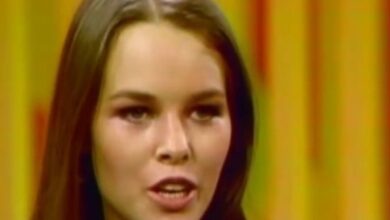Steven Tyler Leads Star-Studded Tribute to Ozzy, His Voice Blazing With Strength
Steven Tyler’s return to the VMAs stage in 2025 was more than a simple tribute—it was a collision of eras, sounds, and legacies. At 77 years old, after retiring from touring due to a vocal injury in 2024, he stepped back into the spotlight alongside Joe Perry, Yungblud, and Nuno Bettencourt to honor Ozzy Osbourne. The performance was introduced by Ozzy’s son Jack and his grandchildren, who wore Ozzy shirts as a heartfelt nod to the man whose shadow loomed over the night.
Yungblud, shirtless and brimming with energy, exploded into “Crazy Train” as the opening salvo. His raw, manic delivery contrasted with the precision of Bettencourt’s guitar, creating a balance between chaos and control. Midway through, he slipped into a jacket for “Changes,” underscoring the transition from wildness to introspection. It wasn’t just theater—it mirrored Ozzy’s duality as both a feral performer and a vulnerable storyteller.
Bettencourt’s guitar work was the linchpin of the medley. His blistering riffs during “Crazy Train” captured the metallic bite of Randy Rhoads, while his acoustic textures on “Changes” brought tenderness that surprised many viewers. Guitar fans noted his switch from a razor-sharp electric attack to 12-string acoustic resonance, proving his versatility and respect for the material.
When Steven Tyler walked out, the arena shifted. His entrance for “Mama, I’m Coming Home” brought goosebumps, not just because of his voice, but because of the symbolism. This was Tyler, the eternal showman, lending his gravitas to Ozzy’s most intimate ballad. His raspy, lived-in vocal tone didn’t disguise age—it embraced it, adding pathos that only decades of wear could provide.
Joe Perry’s presence beside Tyler cemented the gravity of the moment. Playing a reversed-headstock Stratocaster, Perry traded licks with Bettencourt while anchoring Tyler’s vocals. It was a rare sight: two generations of guitar heroes weaving sound together, their interplay a respectful dialogue rather than a duel. For fans, seeing Perry in sync with Bettencourt was like watching lineage unfold in real time.
The medley’s emotional peak came when Yungblud joined Tyler on “Mama, I’m Coming Home.” His cracked, youthful voice interlaced with Tyler’s weathered delivery, symbolizing the bridge between new rock insurgents and the architects of the genre. Their shared harmonies felt raw and imperfect, but that imperfection carried the essence of Ozzy himself.
Ozzy’s family framing the performance deepened its resonance. Seeing his grandchildren on stage wasn’t just sentimental—it was a reminder that Osbourne’s legacy is generational. From Sabbath to solo, from vinyl to streaming, and now to TikTok, his music threads through time in ways few others manage. The tribute wasn’t only for fans—it was for bloodline.
Critics were divided. While mainstream outlets praised the spectacle as one of the night’s high points, figures like Dan Hawkins of The Darkness dismissed it as contrived and cynical. That tension underscored the risk of tributes: they can feel like corporate packaging of raw emotion. Yet, for the thousands watching live, the performance delivered visceral connection, something beyond press commentary.
Nuno Bettencourt’s closing solo added an overlooked layer. While most eyes were on Tyler, Bettencourt subtly shifted the spotlight back to Ozzy’s compositions. His phrasing nodded to Rhoads and Zakk Wylde without mimicry, reminding the audience that guitar was the lifeblood of Osbourne’s catalog. This nuance was missed by casual viewers, but guitarists recognized it instantly.
The VMAs setting mattered. This wasn’t a Rock Hall ceremony or a Grammy stage—it was MTV, the channel that had once turned Ozzy’s wild persona into global pop culture. Placing this tribute in that space wasn’t accidental; it highlighted how Osbourne’s music transcended niche heavy metal circles and became household canon through MTV’s heyday.
A dimension overlooked by many was the generational dialogue embedded in the performance. Tyler represented the 70s arena rock survivors, Perry the blues-rooted guitarists, Bettencourt the virtuosos of the 90s, and Yungblud the digital-era anarchists. Together, they didn’t just honor Ozzy—they mapped four decades of rock evolution in one medley.
There was also a symbolic echo from Ozzy’s “Back to the Beginning” final concert in Birmingham, where Yungblud, Bettencourt, and others had stood by his side. The VMAs performance wasn’t just a tribute—it was a continuation, a reminder that those who closed out Ozzy’s live career were also entrusted with carrying his memory forward.
Tyler’s choice to perform after announcing retirement added a personal layer. His return wasn’t about reclaiming spotlight but about solidarity with a peer. By singing Ozzy’s most vulnerable ballad, Tyler implicitly told the audience: legends don’t disappear when they stop touring, their voices can still matter at critical moments.
The closing embrace between the performers—Yungblud shouting “Ozzy forever!” as the lights dimmed—felt unscripted, a release of tension after walking the tightrope of honoring an icon. It wasn’t flawless, but that imperfection was its strength. Ozzy himself was never about polish; he was about impact.
Ultimately, the 2025 VMAs tribute transcended the format of an awards show performance. It fused spectacle with sincerity, nostalgia with renewal, and family with fandom. By staging it this way, MTV inadvertently created a time capsule—a moment where the old guard, the present generation, and the heirs of the future converged to say the same thing: Ozzy’s shadow will never fade.





